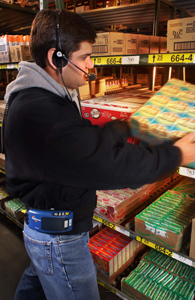| INFORMATION: Free information is available from VOITEQ on the subject in this story. Click here to request a copy |
From the motorway to the high street, to the emails on our computer and now seemingly to the warehouseincreasingly technology is capable of monitoring an individuals movement. The media are happy to portray the UK as becoming the most monitored society in the world, evoking the rather hackneyed Orwellian clichs. But in reality the ability to track an individuals movements is often the by-product of technological advance to achieve an entirely different goal.
Voice technology designed to improve efficiency and work practices in the warehouse is the latest technology to come under fire from technology bashing Luddites. According to a report conducted on behalf of the GMB Union by Durham University, up to 10,000 warehouse and distribution workers are wearing mini computers which monitor their every movefrom productivity to tea breaks.
However are we to believe that every technological advance is driven by the desire to push the worker harder and restrict his liberty? Just because the technology has the ability to monitor the actions of a worker is it really an effective management strategy to deploy the technology just for this use? Big Brother isnt watching, not yet anyway argues David Stanhope, CEO, VoiteQ
The fact and the fiction
Email was created to be a cheap, quick and highly usable mode of communication and it has revolutionised the way that business and life are conducted in much of the world. Yet as a by-product every email you send leaves an indelible record stating where you were, what you were doing and who you were communicating with at any one particular moment in time. Such is the paranoia within industry, standard business practice has now become such that emails must be kept and stored so that in a court of law they are submittable as evidence. Yet no-one questions the use of email under the guise that it is a tool for management to watch and monitor the user. So why the objection to the new voice technology?
Voice technology works by sending instructions, most commonly for picking, from a central computer over a wireless frequency network to operatives in the warehouse. Each operative is equipped with a headset and mouth piece connected to a small computerised device clipped to a belt on the waist. The worker is instructed to carry out a particular action, such as picking a product, they then speak back to the device conveying the relevant information i.e. quantity picked or a check digit to confirm they have picked the correct product. The technology predetermines the most efficient sequence for each worker to carry out the actions around the warehouse so the worker becomes more efficient more quickly, for example, by picking more products in less time.
In many warehouses the devices are linked directly to the software that controls the warehousewarehouse management system (WMS)to instantly update the stock levels giving accurate and transparent visibility of stock in the warehouse. In many others, a simple bolt-on application can be provided to add near real time stock updates quickly and easily to any existing WMS.
The perceived danger is that managers will use the technology to keep tabs on their staff monitoring their every movement, from pallet to toiletwith reprimands sure to follow for spending too much time in either place. But while some unions may shudder at the concept of a remote controlled workforce, the reality is that workers have been clocking on and off for years, while a variety of measures (often inaccurate) of productivity have traditionally been used for bonuses. Indeed many existing UK voice users have already worked closely with unions to smoothly and efficiently implement voice solutions that should benefit all.
Technology that can track movement around warehouses using radio frequency has been around for at least 20 years and voice technology itself is hardly new, having been implemented in the UKs first fully voice-controlled warehouse as long ago as 1998. In other words, the so called new devices are just the next generation of a technology that is already very familiar to warehouse workers.
The argument is that these devices are more invasive than the older ones. After all, they are strapped to people and monitor an individuals movements and not the movement of individual goods. Worse still, critics believe that this type of technology is turning warehouse workers into robots, or automatons dehumanising them by forcing them to converse with an electronic voice for eight hours a day. Can this really be the case?

Technology for spying on the workforceabsolutely not. Voice technology delivers productivity gains and makes the workplace a safer and more ergonomic environment.
Feedback speaks for itself
The critics may do a good job in convincing you to believe what they say but our unique experience and hands-on knowledge of the industry tells a very different story. What the critics dont want you to know is that pickers actually prefer using voice technology to bar code readers or pen and paper lists.
Training time for new recruits is cut from days to hoursworkers can be picking at full speed in no time at all. Typically accuracy of picking in voice enabled warehouses is 99.99 per cent and this cost saving and efficiency is frequently reflected in workers pay packets. Many employers share the benefits of improved productivity and accuracy with their workers and more pickers are hitting their bonus targets than ever before. The ease of use of the system also means they can hit their bonus targets from day one.
There is a considerable safety element to using voice as well. Voice technology allows the worker to operate hands free and eyes free in the warehouse. Rather than having their head buried in a clipboard and reams of paper, or having to constantly look at a screen on a handheld scanner, the worker is far more aware of their surroundings and considerably more reactive to any potential dangers in the warehouse.
Last but by no means least, our experience shows that workers actually enjoy using voice technology. I think it is a gross disservice to warehouse workers to infer that they will not adapt to new technology because they are not skilled enough to use it. We live in a society where people use technology in many aspects of their life and they see a major investment in the technology they use as a sign of appreciation from management for the work that they do. Probably the most important testament to the technology is that if you ask existing users of voice technology in the warehouse if they would go back to their previous method of picking you will get an overwhelming no!
Improving effectiveness
The analogy has been used that tagging workers is akin to creating a battery farm. This is blatantly untrue. This technology is not about constraining an individuals ability to do the job but providing tools that improve their effectiveness. No more lost products, searching for items misplaced in the warehouse or attempting to read poor printouts or illegible handwriting. By providing easy to use voice based information, workers are actually released from the more difficult elements of the warehouse and distribution environment and are able to effectively undertake the job.
Without a doubt this technology is boosting retailer revenuebut with retailers increasingly offering bonus and incentive schemes, this accuracy in tracking is also providing significant opportunities to increase the weekly wage.
The unions should perhaps consult their members before turning to Brussels to seek to outlaw technology which they clearly dont fully understand. Whilst negative connotations for the technology can be conjured, these simply dont stack up in the real world. If they dont reconsider their position they potentially face the embarrassment of their members objecting to the legislation that they propose.

David Stanhope is CEO of VoiteQ, a leading expert in the delivery of voice-directed supply chain solutions for the distribution sector with extensive knowledge of the food services and grocery industries.
| INFORMATION: Free information is available from VOITEQ on the subject in this story. Click here to request a copy |

Add a Comment
No messages on this article yet